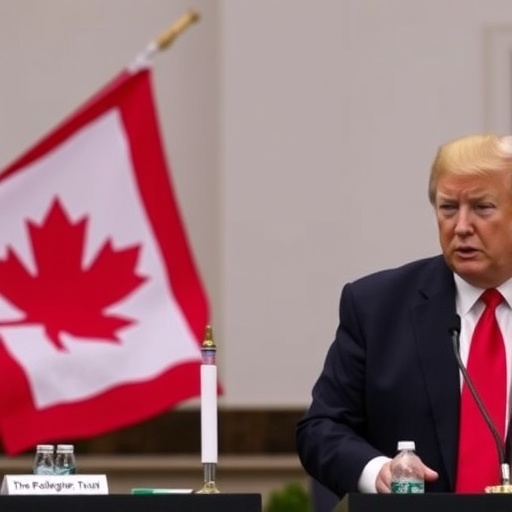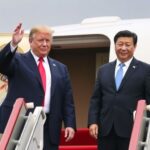Trump Abruptly Halts Trade Talks with Canada Over Controversial Ontario Tariff Ad
In a stunning escalation of cross-border tensions, President Donald Trump has suspended all ongoing trade talks with Canada, citing a provocative television advertisement from Ontario that lambasted U.S. tariffs by invoking the words of former President Ronald Reagan. The decision, announced via a fiery tweet from Trump on Tuesday morning, marks a sharp rupture in what had been a fragile thaw in US-Canada relations following years of tariff disputes. “Canada’s ad was a disgraceful attack on America – talks are OFF until they apologize,” Trump posted, amplifying the rift that could cost billions in bilateral trade.
The ad in question, aired briefly by Ontario’s provincial government, featured Reagan’s iconic 1980s quip about protectionism: “Protectionism is destructionism.” It was designed to highlight the economic pain inflicted on Canadian industries by Trump’s steel and aluminum tariffs, imposed in 2018 under national security pretexts. While the ad was swiftly pulled following Trump’s backlash, the damage appears done, with trade experts warning of a potential domino effect on North American supply chains.
This incident underscores the volatile nature of Trump-era diplomacy, where personal grievances can swiftly derail economic negotiations. With US-Canada trade topping $600 billion annually, the stakes couldn’t be higher. As negotiators scramble to assess the fallout, questions swirl about whether this is a negotiating tactic or a genuine breakdown in talks aimed at resolving lingering disputes from the USMCA agreement.
The Reagan Ad That Sparked Trump’s Fury
The catalyst for this diplomatic showdown was a 30-second TV spot produced by Ontario’s Ministry of Economic Development. Aired during prime time on major Canadian networks last week, the advertisement opened with archival footage of Ronald Reagan delivering his famous line against protectionist policies: “You and I know that protectionism is destructionism.” The script then transitioned to images of shuttered factories in Windsor and Hamilton, Ontario’s auto heartland, juxtaposed with clips of Trump signing tariff orders.
“These U.S. tariffs are hurting families on both sides of the border,” the narrator intoned, emphasizing how the levies – 25% on steel and 10% on aluminum – had driven up costs for Canadian exporters and retaliatory measures that hit American farmers hard. Ontario Premier Doug Ford, a vocal critic of Trump’s trade policies, approved the ad as part of a broader campaign to pressure Washington for relief. “We’re not afraid to speak truth to power,” Ford stated in a press release, though he later distanced himself from the Reagan reference amid the uproar.
The ad’s use of Reagan, a Republican icon revered by Trump, was particularly galling to the U.S. president. White House sources, speaking anonymously, revealed that Trump viewed it as a personal slight, likening it to an “insult from a neighbor who knows better.” Within hours of the ad’s debut, Trump’s Twitter feed lit up with condemnations, calling it “fake news propaganda” and accusing Canada of ingratitude for U.S. security partnerships like NORAD.
Statistics underscore the ad’s targeted message: Ontario alone exports over $50 billion in goods to the U.S. each year, with the auto sector accounting for a third. Tariffs have added an estimated $1.5 billion in annual costs to Canadian steelmakers, according to a 2023 report from the Canadian Steel Producers Association. The ad’s rapid production – filmed in just two days – reflected growing frustration in provincial capitals, where federal negotiations with Washington have yielded little progress on tariff exemptions.
Trump’s Immediate Backlash and Trade Talk Suspension
President Trump’s response was as swift as it was uncompromising. By midday Tuesday, U.S. Trade Representative Katherine Tai confirmed the halt to all active trade discussions with Canada, including those on dairy quotas and digital services taxes under the USMCA framework. “In light of recent provocative actions by Canadian entities, the administration is pausing engagements to reassess priorities,” Tai said in a statement from her office.
Trump himself took to the podium at a rally in Michigan, a swing state battered by trade wars, to elaborate. “Canada thinks they can use my hero Reagan against me? No way! We’re stopping these trade talks until they pull that garbage and show respect,” he declared to cheers from the crowd. The Michigan audience, many employed in industries intertwined with Canadian supply chains, heard Trump promise “fair deals only,” echoing his 2016 campaign rhetoric that propelled him to victory.
This isn’t the first time Trump’s personal style has influenced trade policy. During his first term, similar spats led to the renegotiation of NAFTA into USMCA, but progress stalled on key issues like Canada’s supply management system for dairy, which protects local farmers from U.S. competition. Recent talks, resumed in early 2024, aimed to iron out disputes over electric vehicle tariffs and critical minerals – vital for the green energy transition. Now, with Trump’s suspension, those efforts are in limbo.
Economic data highlights the urgency: The U.S. imports $350 billion from Canada yearly, including 80% of its crude oil and key auto parts. A prolonged freeze could disrupt just-in-time manufacturing, potentially adding $10 billion in costs across North America, per estimates from the Peterson Institute for International Economics. Trump’s move also risks alienating allies at a time when the U.S. seeks a united front against Chinese trade practices.
Canada’s Quick Retreat: Ad Pulled as Tensions Simmer
Facing immediate blowback, Ontario officials yanked the ad from airwaves by Tuesday evening, issuing a terse apology that stopped short of retracting its core message. “The intent was to advocate for fair trade, not to offend,” read a statement from Premier Ford’s office. The province committed to redirecting the campaign’s budget toward “diplomatic channels,” but insiders suggest the pullback was pragmatic, aimed at avoiding broader federal repercussions.
Canadian Prime Minister Justin Trudeau, navigating his own re-election bid, treaded carefully. In a press conference from Ottawa, he acknowledged the ad’s removal while defending Canada’s right to critique policies affecting its economy. “Trade talks with the U.S. are vital, and we’re committed to constructive dialogue,” Trudeau said, though he avoided naming Trump directly. Behind the scenes, Canadian diplomats reportedly lobbied Washington for a cooling-off period, emphasizing shared interests in border security and Arctic sovereignty.
The ad’s brief run still resonated across Canada, galvanizing public support for tougher stances on U.S. tariffs. Polls from Angus Reid Institute show 62% of Canadians view Trump’s policies as unfair, up from 55% in 2022. In Ontario, where manufacturing employs 800,000 workers, the ad tapped into real grievances: Unemployment in tariff-hit sectors rose 2.5% last year, per Statistics Canada data.
Yet, the retreat highlights Canada’s asymmetric position in US-Canada trade talks. As the smaller economy – with GDP one-tenth of the U.S. – Ottawa often opts for de-escalation to protect export-dependent industries. Historical precedents, like the 2018 softwood lumber dispute, show how prolonged standoffs favor American leverage, leading to Canadian concessions worth billions.
Navigating the Fallout: Impacts on USMCA and Beyond
The suspension of trade talks reverberates far beyond the ad’s controversy, threatening the stability of the USMCA, which Trump hailed as his “biggest deal ever.” Ratified in 2020, the agreement governs 75% of North American trade but includes review clauses set for 2026. Lingering issues, such as Canada’s 270% dairy tariffs and U.S. complaints over auto content rules, were prime topics in recent sessions. Now, with talks halted, these disputes risk festering.
Industry leaders are sounding alarms. The American Automotive Policy Council warned that delays could hinder EV production, where Canada supplies 40% of U.S. battery minerals. “This knee-jerk reaction undermines supply chain resilience,” said Matt Blunt, the council’s CEO, in a statement. On the Canadian side, Unifor, the union representing auto workers, called for federal intervention, noting that 150,000 jobs in Ontario depend on seamless U.S. ties.
Broader geopolitical context adds layers: With global trade fragmenting amid U.S.-China tensions, a fractured US-Canada partnership weakens North America’s negotiating power. Trump’s approach, blending bravado with deal-making, has yielded mixed results – tariffs generated $80 billion in revenue but sparked retaliatory duties costing U.S. exporters $27 billion, according to the U.S. Chamber of Commerce.
Quotes from Capitol Hill reflect bipartisan concern. Senate Minority Leader Chuck Schumer (D-NY) tweeted, “Trump’s tantrums hurt American workers – time for steady leadership in trade talks.” Meanwhile, Republican Senator Lindsey Graham (R-SC) urged restraint, saying, “Canada’s our closest ally; let’s not blow up relations over an ad.” These voices suggest potential congressional pushback if the standoff drags on.
Looking Ahead: Pathways to Resume Trade Talks Amid Uncertainty
As the dust settles, pathways to resumption remain murky, but experts foresee a mix of backchannel diplomacy and concessions. U.S. officials hint at conditional restarts if Canada offers tariff relief on agricultural goods, a longtime Trump priority. Canadian Ambassador to the U.S. Kirsten Hillman emphasized in an interview with CBC, “We’re prepared to engage when tempers cool – trade talks benefit both nations.”
Forward-looking scenarios include a potential summit between Trump and Trudeau at the G7 in June, where side deals on energy exports could rebuild momentum. Economists project that a six-month delay in talks might shave 0.5% off Canadian GDP growth, while U.S. consumers face higher prices for imported goods. Investment firms like RBC Capital Markets advise clients to hedge against volatility, with cross-border mergers already down 15% year-over-year.
In the long term, this episode could accelerate diversification efforts: Canada eyes deeper EU ties via CETA, while the U.S. courts Indo-Pacific partners through the IPEF framework. Yet, the intertwined economies – sharing 5,500 miles of border and $2.6 billion in daily trade – make divorce unlikely. Trump’s suspension may be a bluff to extract better terms, but if it hardens into policy, it risks a new era of protectionism that echoes the very destructionism Reagan warned against.
Stakeholders on both sides urge pragmatism. As one trade analyst from the Brookings Institution put it, “In US-Canada trade talks, bluster is currency, but resolution demands compromise.” With midterm elections looming in the U.S. and provincial votes in Canada, political calendars may force a thaw sooner than expected, preserving the economic lifeline that binds the neighbors.








